Annual Meeting Catalyzes Information-Sharing on Cutting-Edge Discoveries to Contribute to Necessary Changes in Pandemic Preparedness
Tulane’s Dr. Robert Garry Awarded GVN’s 2023 Robert C. Gallo Award for Scientific Excellence and Leadership
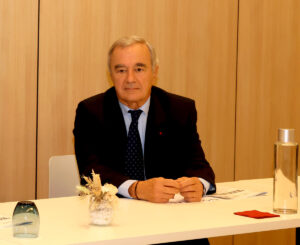
CSM’s Prof. Patrick Rampal co-leads discussions during the meeting.
Credit: Claudia G. Albuquerque
Monte Carlo, Monaco, October 24, 2023: Capping the three day meeting of the Global Virus Network (GVN)—hosted in partnership with the Centre Scientifique de Monaco (CSM, a GVN Affiliate) and the Princely Government of Monaco—were intimate discussions between H.S.H. Prince Albert II of Monaco and the GVN on the state of pandemic preparedness and need for collaborations, particularly in and among small nations. Participants from academia and industry also revealed novel anti-viral therapies, advances in the study of Long COVID, evolving concerns over potential viral threats, and new technologies for virus detection, such as wastewater sampling, to improve upon preventing and responding to outbreaks.
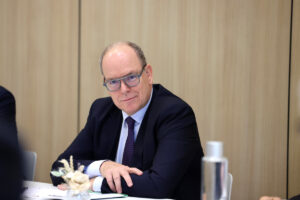
Credit: Claudia G. Albuquerque
Continuing from his previous comments, H. S. H. Prince Albert II of Monaco said, “GVN has enabled Monaco to evaluate the actual efficacy of vaccination against COVID-19 by testing all of Monaco’s population for neutralizing antibodies against the virus. Monaco is the only country in the world to do this, and the collaboration with GVN has been instrumental to the success of the program. Indeed, Monaco does not have expertise in laboratory experience, in particular immunology. So, we are grateful to the GVN for closing this gap for us, particularly during the height of the COVID pandemic, by connecting us to its Center of Excellence Director Dr. Linfa Wang, who provided us the only novel kits to test for neutralizing antibodies. Otherwise, we would have been lost. GVN provided us a team capable of measuring biomarkers so that we could conduct research and collect data that continue to be useful to us today.”
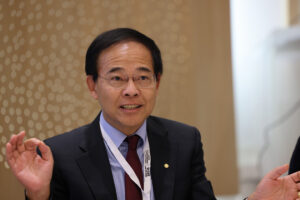
Credit: Claudia G. Albuquerque
Dr. Linfa Wang of Duke-NUS Medical School in Singapore added, “Small countries can do big things with the proper resources. With our help, Monaco became the only nation in the world to offer SARS-CoV-2 immunity test kits to its citizens. We have unique data on individuals for two years now, which provides necessary information in guiding future research.”
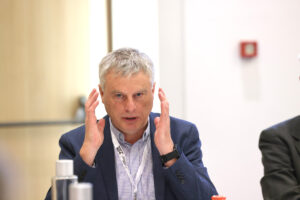
Credit: Claudia G. Albuquerque
Dr. Johan Neyts of the Rega Institute for Medical Research, University of Leuven-Belgium, provided poignant context: “In September, 2019, I attended a conference in Wuhan, where we discussed not being ready for a pandemic. We need to be prepared by developing anti-viral medications that are highly potent and broad-acting. Paxlovid should have been developed during ‘peacetime,’ and poised to be widely distributed, making a major impact. If the elderly had this medication sooner, it would have helped tremendously and provided us with a defense against this virus, so we had more than just face masks and social distancing. I am pleased to be presenting on our development of novel anti-viral research towards drug therapies that treat multiple viral infections.”
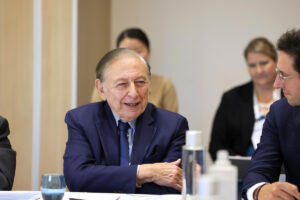
Credit: Claudia G. Albuquerque
Dr. Robert Gallo, Co-Founder and Chair of the Scientific Leadership Board of the Global Virus Network and Co-Founder and Emeritus Director of the Institute of Human Virology at the University of Maryland School of Medicine, noted “We are often asked, why not just follow government? I ask, ‘Which government?’ For example, look at what happened to Sweden against the advice of scientists worldwide, and as presented today by GVN’s Dr. Anders Vahlne of the Karolinska Institut. Untold amounts of lives were lost in their government’s un-scientific strategy to gain herd immunity. I ask, ‘Why should a public health response be just limited to government experts?’ We need to have independent expertise as a partner to the government, and GVN aims to do just that.”
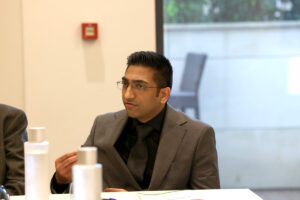
Credit: Claudia G. Albuquerque
Dr. Rubeshan Perumal of the Centre for the AIDS Programme of Research (CAPRISA) in South Africa discussed his work on co-leading the GVN Long COVID Task Force. “Middle to low-income countries, with the help of funders across the world, have made an investment in science in general over the decades, such as with HIV. This has positioned us to have a robust clinical trial network allowing us to have a robust response to COVID-19. My work in diagnostics and epidemiology, and in understanding long-term COVID, has positioned our GVN Task Force to launch initiatives aimed at achieving global consensus about the nature of the long term COVID problem, the scientific challenges, and advocating for better diagnostics to Long COVID. Long COVID is a substantial burden to society and is under-represented in socio-economic groups. This is a global problem and needs a global solution that we are working on through the GVN.”
Concluding the discussion, H.R. H. Prince Albert II of Monaco said, “You can count on our support, and we thank you for your work. We are committed to supporting you – the Global Virus Network.”
During the final day’s presentations, Dr. Sara Javornik Cregeen of Baylor College of Medicine in the USA was one of several presenters who spoke about detecting viral outbreaks through wastewater testing. Scientists discussed how to translate into action the two-week lead time in detection of an epidemic via wastewater. Dr. Javornik Cregeen said, “There is downtime to a sequencing approach and, in turn, data. However, we are working on that. We have multiple action groups, coordinating with wastewater utilities, to include them in conversations to aid in transparency.” She particularly highlighted the importance of the utility companies and other stakeholders being assured that the data will be used wisely, and not just shutdown economies. Currently, she is working with the Texas legislature to establish standard operating procedures.
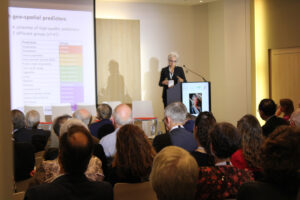 Dr. Marion Koopmans from the Erasmus Medical Center in the Netherlands and Dr. Pascal Barbry from the CNRS in France described parallel efforts and explained how a 2022 European Commission recommendation on SARS-CoV2 could lead to more comprehensive virus surveillance across Europe. The GVN’s Viral Detection and Control Watch Group is poised to help address these and other challenges to wastewater sampling that are not just present in the utilities sector, but also in academic institutions where the research is being done and where data could be collected.
Dr. Marion Koopmans from the Erasmus Medical Center in the Netherlands and Dr. Pascal Barbry from the CNRS in France described parallel efforts and explained how a 2022 European Commission recommendation on SARS-CoV2 could lead to more comprehensive virus surveillance across Europe. The GVN’s Viral Detection and Control Watch Group is poised to help address these and other challenges to wastewater sampling that are not just present in the utilities sector, but also in academic institutions where the research is being done and where data could be collected.
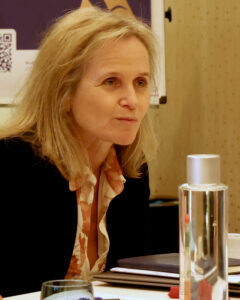
Credit: Claudia G. Albuquerque
Dr. Sharon Lewin, director of the Peter Doherty Institute for Infection and Immunity in Australia, chaired the final scientific session “Advancing Antiviral Diagnostics and Treatment Through Innovation” and noted that in the case of polio wastewater detection, scientists and health officials can warn the public when there is a rise in cases and issue health alerts. She also noted that multiple levels of communication are important, not just between scientists, wastewater utilities, and government, but with doctors, so that they are on alert for an increase in patients presenting disease in their clinics.
Dr. Javornik Cregeen ended her presentation by saying that the meeting’s focus earlier on using artificial intelligence (AI) to enhance research efforts was also valuable. With over 4,000 detectable viruses in wastewater, AI will help sort through intricate data. She said, “We are using AI for predictive modeling and incorporating health data through the Texas Medical Center and hospitals, which will help in developing modeling tools in AI.”
Dr. Jean-Paul Gonzalez of Georgetown University Medical Center School of Medicine in Washington, DC emphasized the importance of understanding the mechanisms in the emergence of pathogenic viruses, often linked to animals, and appreciating their potential for transmission in societies. He said, "In accordance with societal environments - as different as they may be - a global approach to public and veterinary health, transdisciplinary efforts such as the One Health type is required, an expanded safe and secure exchange of data is necessary especially as the members of the GVN express by the diversity of approaches of its centers of excellence. Finally, and not least, the success of these actions involves educating health decision-makers, politicians, and their financiers in global health. We will remember that isolation, mask, and quarantine are the historical and effective heritage of these fundamentals in the response to past epidemic risks."
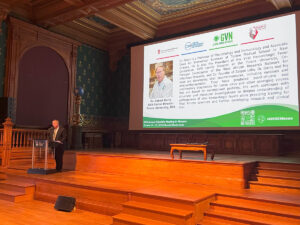
During the meeting, a gala was held at the Musée Océanographique de Monaco, where GVN honored several individuals: GVN’s 2023 Robert C. Gallo Award for Scientific Excellence and Leadership was presented to Dr. Robert Garry of the Tulane University School of Medicine, USA; Dr. Robert Gallo was honored with the GVN Lifetime Achievement Award; Dr. Christian Bréchot of the University of South Florida, USA, who will be stepping down as President and becoming Vice Chairman of the GVN Board of the Directors, was honored with the GVN Excellence in Leadership Award; and Dr. Patrick Rampal of the Centre Scientifique de Monaco was honored for co-hosting the highly successful meeting in Monaco.
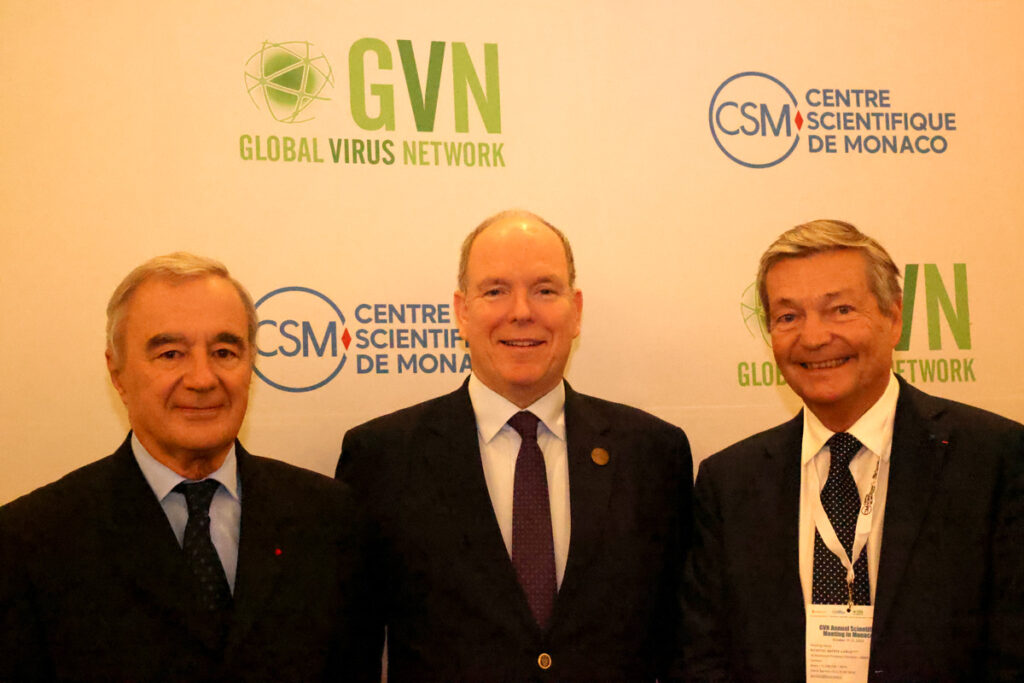
Dr. Patrick Rampal, H.S.H. Prince Albert II, Dr. Christian Bréchot
Credit: Claudia G. Albuquerque
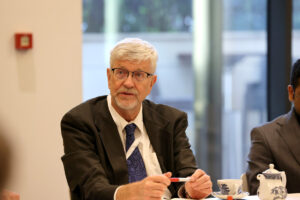
Credit: Claudia G. Albuquerque
Dr. Sten Vermund of the Yale School of Public Health, USA, and GVN President-Elect said, “The GVN grew significantly under the leadership of Dr. Christian Bréchot. I look forward to creating meaningful partnerships and securing more resources to support programs that include training, surveillance, and small grant awards. We look forward to engaging additional organizations such as the European Union, the World Health Organization, and such entities as the African, Chinese, and U.S. Centers for Disease Control and Prevention to make GVN more visible and a go-to resource for governments at a local, national, and international level. We also look forward to adding and diversifying GVN’s leadership, providing even more opportunities to emerging economies, while maintaining independence to promote data-driven science.”
Dr. Vermund announced that the 2024 GVN Annual Meeting will be held in Durban, South Africa at CAPRISA and co-hosted by Drs. Quarraisha and Salim Abdool Karim and Dr. Rubeshan Perumal.
For the full three-day agenda of the GVN Annual Scientific Meeting in Monaco, visit: https://gvn.org/gvn-2023-monaco/.
About the Global Virus Network (GVN)
The GVN is essential and critical in the preparedness, defense, and first research response to emerging, existing, and unidentified viruses that pose a clear and present threat to public health. Working in close coordination with established national and international institutions, the GVN is a coalition comprised of eminent human and animal virologists from 71 Centers of Excellence and 9 Affiliates in 40 countries, working collaboratively to train the next generation, advance knowledge about how to identify and diagnose pandemic viruses, mitigate and control how such viruses spread and make us sick, as well as develop drugs, vaccines, and treatments to combat them. No single institution in the world has expertise in all viral areas other than the GVN, which brings together the finest medical virologists to leverage their individual expertise and coalesce global teams of specialists on the scientific challenges, issues, and problems posed by pandemic viruses. The GVN is a non-profit 501(c)(3) organization. For more information, please visit https://gvn.org/. Follow us on X at @GlobalVirusNews.
Media Contact: Nora Samaranayake +1-443-823-0613 or [email protected]
Click/tap for the newswire version, which includes links to high-resolution images.
